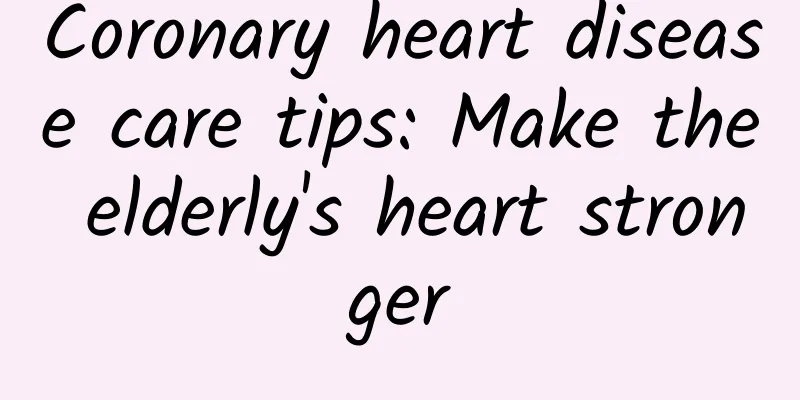Coronary heart disease care tips: Make the elderly's heart stronger

|
Coronary heart disease is a common chronic disease among the elderly. As people age, problems with the heart and blood vessels occur easily, especially the stenosis of the coronary arteries, which can affect the blood supply to the heart. Symptoms of coronary heart disease include angina pectoris, dyspnea, and in severe cases, myocardial infarction. For the elderly with coronary heart disease, mastering some daily care skills can help them better cope with the disease and improve their quality of life. Although coronary heart disease may cause inconvenience to the elderly, reasonable lifestyle adjustments and care can effectively relieve the pressure on the heart and enhance their heart function. Here are some care tips that are close to life, hoping to help families who care for elderly people with coronary heart disease. Diet management: health starts from the dining tableFor patients with coronary heart disease, dietary adjustment is an important aspect of daily care. Elderly people often face the problem of loss of appetite, but at the same time, their nutritional needs will not be reduced. Therefore, providing food that is both nutritious and easy to digest is the first priority in caring for the elderly with coronary heart disease. First of all, a low-salt diet is essential for patients with coronary heart disease. Excessive salt intake can cause water retention in the body, increase the burden on the heart, and cause high blood pressure, which is very bad for the already damaged coronary arteries. Therefore, when preparing meals for the elderly, family members should try to reduce the amount of salt used and use some natural condiments such as herbs, garlic or ginger to enhance the flavor of the food. In addition, care should be taken to avoid processed foods and pickled foods, as they usually contain a lot of hidden salt. Secondly, controlling fat intake is also critical. A high-fat diet can lead to increased cholesterol levels in the blood, further exacerbating the blockage of coronary arteries. It is recommended to choose healthy fat sources, such as omega-3 fatty acids in olive oil and fish, and reduce the intake of saturated fat and trans fat. Eating more fresh vegetables and fruits can help provide the elderly with rich antioxidants and help reduce the progression of arteriosclerosis. Finally, a reasonable intake of protein is also very important for maintaining the physical strength of the elderly, but excessive intake of red meat may increase the risk of coronary heart disease. You can choose some easily digestible and healthy protein sources, such as fish, beans and poultry, which not only provide sufficient nutrition, but also will not increase the burden on the heart. Moderate exercise: Improves heart functionAlthough the elderly have coronary heart disease, this does not mean that they should avoid exercise completely. Moderate physical activity can not only enhance the function of the heart, but also help control weight, improve blood circulation, and lower blood lipid and blood sugar levels. However, the amount and intensity of exercise must be controlled to avoid adverse effects on the heart due to excessive exertion. For elderly people with coronary heart disease, walking is one of the best forms of exercise. Arranging some time every day to walk slowly with the elderly can not only help exercise the cardiopulmonary function, but also relieve the mood and reduce psychological pressure. Family members can help the elderly develop a simple exercise plan, such as walking for 20 to 30 minutes each time, four to five times a week, which will not make the elderly feel tired and can effectively enhance their physical strength. In addition to walking, the elderly can also try some low-intensity exercises, such as Tai Chi or gentle stretching. These exercises are not only good for the heart, but also improve balance and reduce the risk of falling. The key to exercise is perseverance. No matter what form of exercise, it should be performed when the elderly feel comfortable and avoid any strenuous exercise or sudden movements. Psychological care: relieve emotions and reduce stressCoronary heart disease not only affects the body, but may also cause psychological stress to the elderly. Elderly people with chronic diseases often feel anxious or depressed, and these emotions in turn affect their condition. Family members should pay more attention to the emotional changes of the elderly in daily life and relieve their psychological burden through companionship and conversation. Creating a relaxed and pleasant living environment for the elderly and helping them find activities of interest, such as planting flowers and plants, reading or handicrafts, can effectively improve their mood. Maintaining a positive mental state is essential for the health of patients with coronary heart disease. If the elderly experience persistent anxiety or depression, family members can advise them to seek professional psychological help to avoid further adverse effects of emotional problems on physical health. Lifestyle habits: Establish a healthy routineMany small habits in daily life can affect the health of elderly people with coronary heart disease. First of all, quitting smoking is crucial for them. Smoking causes vasoconstriction, increases the burden on the heart, and aggravates the symptoms of coronary heart disease. Even if the elderly have been smoking for many years, quitting smoking can still significantly improve their health. Limiting alcohol is also very important. Although moderate drinking may have certain benefits for the heart, it is crucial for patients with coronary heart disease to control alcohol intake to avoid high blood pressure or abnormal heart rate. Maintaining a good work and rest habit can also help reduce heart pressure. Elderly people with coronary heart disease usually need adequate rest time. Ensuring a comfortable sleeping environment with good air circulation and suitable temperature can help them rest better. If the elderly often have difficulty breathing at night or poor sleep quality, it is recommended to consult a doctor whether they need to use respiratory assistance equipment. Regular follow-up and monitoringCoronary heart disease is a disease that requires long-term management, and regular follow-up visits and monitoring are essential. Family members should help the elderly see doctors on time, conduct regular electrocardiogram, blood pressure, blood lipid tests, etc., and keep abreast of changes in the condition. At the same time, home care can also monitor the elderly's daily blood pressure, weight, and other changes. In particular, sudden weight gain may mean fluid retention, which requires timely communication with the doctor. In daily care, family members should also supervise the elderly to take medicine on time and pay attention to the effects or side effects of the medicine. If the elderly forget to take medicine or use it repeatedly, family members should remind and correct it in time to ensure the continuity and effectiveness of treatment. SummarizeThe care of coronary heart disease requires multi-faceted efforts, including not only diet, exercise and drug management, but also psychological care and lifestyle adjustments. For the elderly with coronary heart disease, a healthy diet, proper exercise, a good work and rest schedule, and family care and support are all important factors in maintaining their heart health. Through these daily care measures, family members can help the elderly reduce the burden on their hearts and improve their quality of life. Although coronary heart disease cannot be cured, through scientific management and care, the elderly can still live a healthy and fulfilling life. Ultimately, the support and care of family members will become the most solid backing for the elderly with coronary heart disease, making their hearts stronger and their lives better. Author: Liu Yangyang, People's Hospital of Inner Mongolia Autonomous Region |
>>: A small "quail egg" grew on the right eyelid. The 63-year-old man was diagnosed with cancer.
Recommend
Height chart of girls before menarche
The first menstruation, that is, the first time a...
Malwarebytes: 2019 Cybercrime Report for Healthcare Professionals
Malwarebytes released its 2019 Healthcare Cybercr...
What is the nutritional value of red wine steak? How often should you turn over the red wine steak?
The most attractive thing about steak fried with ...
How long after menstruation can I see the gestational sac
Many female friends have experienced delayed mens...
Dry eyes...how did it become a terminal illness?
How many times have you watched "Kuaisan&quo...
Can't eat peaches and watermelons together, will it cause poisoning? Can't drink lemonade during the day? Here comes the truth
With the arrival of summer, fruits and vegetables...
What kind of curtains are good for the bathroom? What kind of curtains are suitable for the bathroom?
We all know that the bathroom is an important pla...
Pregnant women with oral inflammation
Women will take a lot of supplements during pregn...
Does a posterior uterus affect infertility?
Many female friends do not know much about the po...
Who are the mentors of Youth With You? When will Youth With You be broadcast?
The mentor lineup of the show is said to include ...
Comparison between toothache and labor pain
As the saying goes, toothache is not a disease, b...
10 years after hysterectomy
Whether a woman's body is healthy or not is c...
Can you wear a condom during sex if you have bacterial vaginitis?
Generally speaking, women are more likely to be i...
Are there any symptoms of ruptured ovarian follicle?
The follicle is an important component of the fem...
Can Schefflera take root in water? How to care for hydroponic Schefflera
Schefflera is very common in our daily life. It i...









